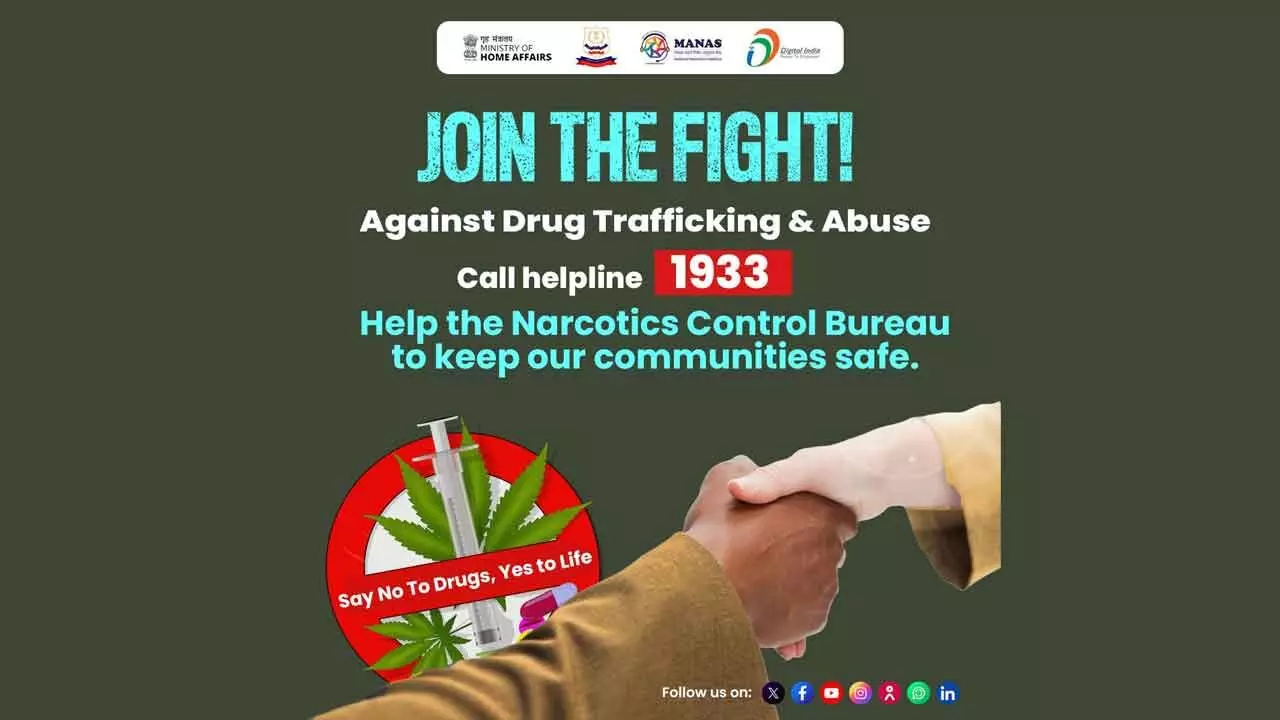India’s War Against Drug Lords Can Be Intensified If Every Responsible Citizen Joins The Battle
Drug mafia operations were dented when Amit Shah vowed to transform the ‘Golden Triangle’ into a ‘Death Triangle’
India’s War Against Drug Lords Can Be Intensified If Every Responsible Citizen Joins The Battle

As drug trade is an organised crime, it can only be combated through joint efforts. Coordination between the central and state governments and a strong will to eliminate this societal evil are essential
It is a common perception in the country that Punjab is inching towards destruction largely due to the high level of drug addiction that is prevalent there. Of course, the situation is quite alarming in Goa, Mizoram, Meghalaya, and Manipur, perhaps to a lesser extent.
Many believe that the root of Manipur's problems lies in drug trade that dates back to several decades. Drug mafias and their networks have maintained a ‘Golden Triangle’ for drug trafficking between Manipur and Myanmar.
Meanwhile, ever since Union Home Minister Amit Shah declared his intention to transform this ‘Golden Triangle’ into a ‘Death Triangle’, drug mafia operations have been disrupted, leading to the loss of lives of many agents. This is unlike in the past, when they had a field day because almost all drug traffickers enjoyed political protection from the north-eastern states and hence could operate discreetly.
After Shah implemented a zero-tolerance policy against drug dealers, the drug mafias have taken steps to fuel insurgency in the entire belt.
Organised crime syndicates are most prominent in the drug trade. While there are no precise figures about the magnitude of the drug syndicate business, every country is aware that this is the largest illegal global ‘trade’.
According to Shah, drugs worth Rs 16,914 crore were seized in India in 2024 alone. Some countries are even promoting this trade, possibly due to the absence of a proper system, and the de-facto rule of hard core criminals.
There are five countries where the drug trade is most prevalent, including Iran, Afghanistan, Russia, the United States and the United Kingdom.
India is among the few countries that have always been targeted by drug syndicates. With the world's largest population and borders shared with China, Bhutan, Nepal, Pakistan, Bangladesh, and Myanmar, India has become a major and relatively easy market for drug dealers.
Making it worse, Pakistan has used drug shipments as a weapon in its proxy war against India. A report from the Home Ministry is alarming: In December 2024, it was reported that ISI is not only sending drug shipments into India but also infiltrating drug addicts to deliver specific messages to their handlers imprisoned in Indian jails. Today, several states are among those where drugs are most frequently sold and consumed.
Many countries worldwide, including India, are troubled by drug mafias while United States has the highest number of drug addicts.
However, India has taken the problem of drug addiction seriously and is addressing it quite effectively, stemming from the Modi’s government campaign for a drug-free India.
The central government is dealing with the issue of drug addiction with great sensitivity. The seriousness is evident from the fact that it is running over 340 de-addiction centres across the country with its own resources. It is not only working to prevent the entry of drug shipments by engaging in strategic partnerships with state governments but also running de-addiction campaigns on humanitarian grounds, while reaching out to those affected.
Apart from various Union ministries like Home Affairs, HRD, Finance, and Social Justice and Empowerment, many states are participating in this effort. The entire chain, from the bottom to the top, is being investigated, even if only a small packet of narcotics is recovered. After all, as drug trade is an organized crime, it can only be combated through joint efforts. Coordination between the central and state governments and a strong will to eliminate this societal evil are essential.
Recently, Shah stated that his ministry has established a four-level Narco Coordination Centre mechanism with states to improve coordination between central and state agencies working against organised criminals. A dedicated web portal, NCORD, has been launched to ensure that all agencies work in the same direction and exchange information in real-time. Similarly, a dedicated Anti-Narcotics Task Force has also been formed. Paramilitary forces like the BSF and Assam Rifles have been authorised under the NDPS Act to conduct search operations against drug syndicates and seize all the banned substances from their possession. The Narcotics Control Bureau itself is conducting anti-narcotics operations in collaboration with the Navy, Coast Guard, and other security agencies.
We have achieved significant successes in recent years. From 2014 to 2024, one crore kg of drugs valued at Rs1.5 lakh crore have been seized. Over six lakh 56 thousand drug cases have been registered, which is a significantly higher figure than what was done before 2014.
However, the truth is also that the drug trade has not stopped and continues to reach people discreetly.
As Shah has said the fight against drugs cannot be won by the central government alone. The society and all states must play their part to wipe out this menace. And like, charity, the campaign against drugs should begin at our homes.
(The author is Delhi-based senior journalist and writer. He is author of Gandhi's Delhi which has brought to the forth many hidden facts about Mahatma Gandhi)

